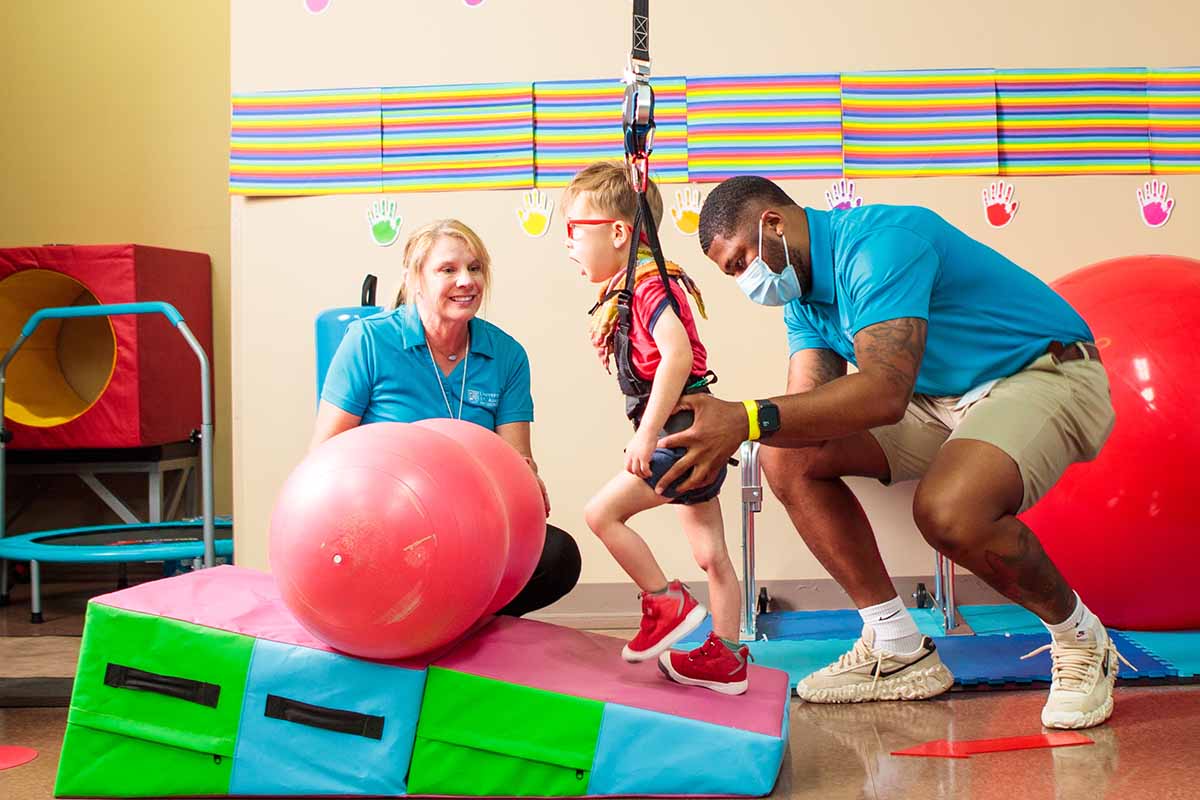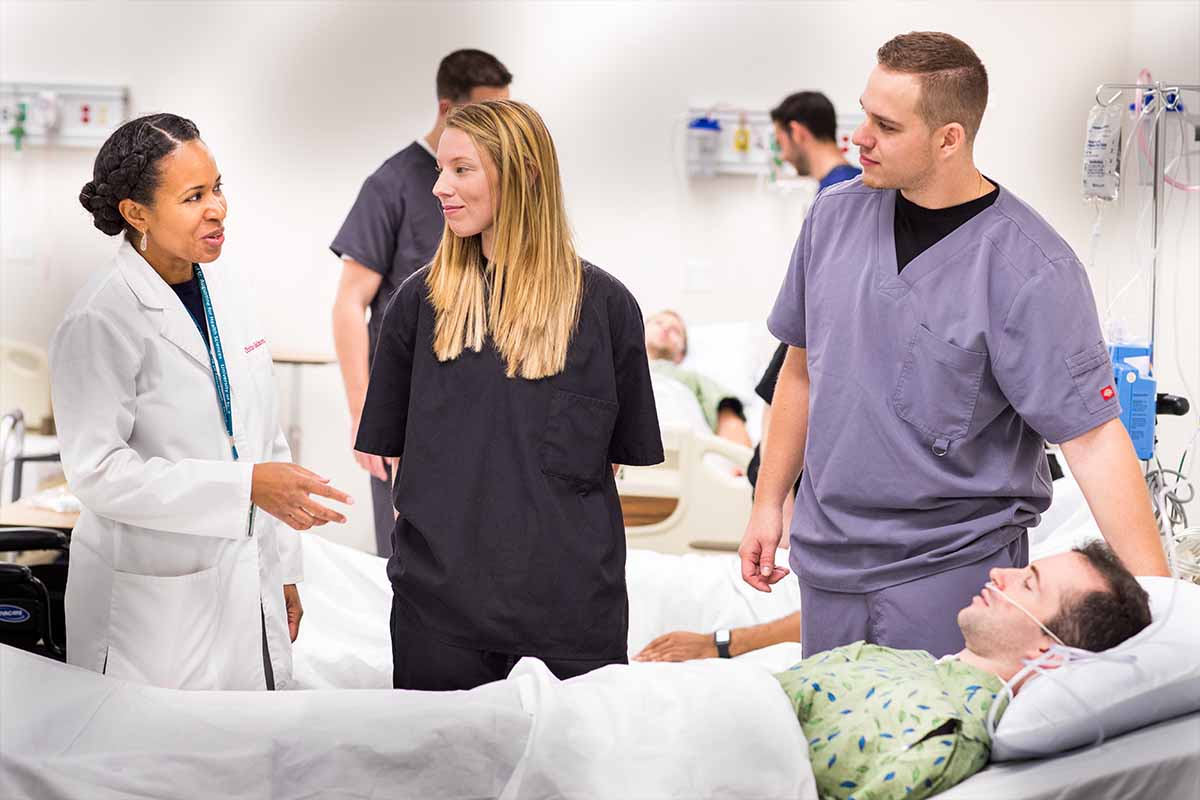

A degree in speech pathology opens the door to a growing field and career opportunities in healthcare, as well as both early and higher education.1
Speech-language pathology programs address speech, language, cognitive and swallowing disorders, including speech issues associated with dementia, autism, stroke, brain trauma and premature birth.1
A Master of Science in Speech-Language Pathology (MS-SLP) equips professionals with the necessary academic and clinical skills to expertly treat patients.1 Below, we’ll take a look at six reasons to earn an MS-SLP and pursue a career in speech-language pathology.
#1 Positive Career Outlook Spells Job Security
The U.S. Bureau of Labor Statistics (BLS) predicts that between 2021 and 2031, we’ll see 5% overall growth across all jobs.2
In comparison, the predicted growth for U.S.-based speech-language pathologists is 21% over the next decade. That rate is expected to equate, on average, to 14,000 new job openings per year.3
#2 Accessible Educational Path
To work as a licensed speech-language pathologist or speech therapist, you need to complete an MS-SLP.4 Standard programs are relatively accessible for any graduate student, in terms of admissions requirements and academic time commitment.
Most programs:
- Can be completed in two years or less if attending full-time
- Offer flexible options such as part-time and self-guided tracks
- Provide online access for didactic courses
- Help prospective students fill in missing prerequisite undergrad courses

#3 Solid Earning Potential
As of May 2021, the average annual base salary for speech-language pathologists was $79,060.3 However, earning potential may be higher for SLP professionals who have moved into leadership and management roles, as the BLS’ current job description associated with that salary exclusively pertains to assessing and treating patients.3
#4 Wide Range of Specializations
Pursue a speech-language pathologist degree and you’ll have options to choose your discipline and setting, including research, teaching, clinical supervising, consultation and treatment.
This field also allows professionals to work with a wide range of age groups, from pediatric to elderly patients. Generally, speech-language pathologists specialize in treating patients with communication or swallowing difficulties related to:1
- Motor speech disorders
- Strokes and brain trauma recovery
- Craniofacial disorders
- Autism
- Neurogenic communication disorders
- Developmental disabilities
- Dementia
- Deaf and hard-of-hearing conditions
- Bilingual speech
#5 Impact on Patient Lives
For many SLP patients, communication limitations can damage their ability to express and meet their core needs and connect meaningfully with others. As a speech-language pathologist, you’ll help patients gain or recover a critical part of their health, independence and dignity.
Whether you work as a generalist or focus on specific populations or conditions, a speech pathology career puts you in a position to meaningfully impact patient lives.
#6 Travel Options
An excellent perk of some healthcare careers is the ability to travel. You can opt to work as a travel speech-language pathologist and work with an agency to choose assignments and fulfill staffing needs across the country.
As a travel therapist, you can:
- Earn premium pay from organizations dealing with staff shortages and urgent needs
- Receive funds to cover the cost of travel and housing
- Select positions that allow you to broaden your skills or further a specialization
- Choose destinations you’d like to visit before moving

Is an MS-SLP Right for You?
Earning a speech-language pathologist degree can lead to a career that challenges you daily, builds security and wealth and betters your patients’ daily lives.
If you’re ready to start your SLP journey, we invite you to consider a Master of Science in Speech-Language Pathology (MS-SLP) from the University of St. Augustine for Health Sciences (USAHS).
At USAHS, you’ll belong to a cohort of peers learning under the mentorship of expert faculty practitioners. Our MS-SLP program is an immersive, hybrid format that is primarily online with in-person residencies and offers three intakes per year—September, January, and May.
From high-tech teaching tools to hands-on work in state-of-the-art simulation centers, you’ll develop the skills to work with patients dealing with communication and swallowing difficulties across their lifespan and conditions.
Visit us today to learn more about the MS-SLP program, attend a free webinar or start your application.
Sources:
- “About Speech-Language Pathology Careers,” American Speech-Language-Hearing Association, last modified 2022, https://www.asha.org/students/about-speech-language-pathology-careers/
- “Employment Projections: 2021-2031 Summary,” U.S. Bureau of Labor Statistics, last modified September 2022, https://www.bls.gov/news.release/ecopro.nr0.htm
- “Speech-Language Pathologists,” U.S. Bureau of Labor Statistics, last modified September 2022, https://www.bls.gov/ooh/healthcare/speech-language-pathologists.htm
- “Planning Your Education in Communication Sciences and Disorders,” American Speech-Language-Hearing Association, last modified 2022, https://www.asha.org/students/planning-your-education-in-csd/








